| 25 February |
• yesterday • tomorrow |
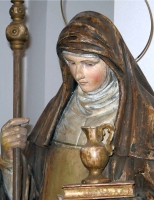
Auboué, Avangour, Avongourg, Bugga, Falbourg, Gaubourg, Gauburge, Gaudurge, Gualbourg, Valborg, Valburg, Valpurge, Valpuri, Vaubouer, Vaubourg, Walbourg, Walburg, Walburge, Walpurd, Walpurga, Walpurgis, Waltpurde, Warpurg
• 12 October (translation of relics to Eichstätt)
• 24 September (translation of relics to Zutphen)
Daughter of Saint Richard the King. Sister of Saint Willibald and Saint Winebald. Student of Saint Tatta at Wimborne monastery, Dorset, England, where she later became a nun.
Beginning in 748, she evangelized and healed pagans in what is now Germany with Saint Lioba, Saint Boniface, and her brothers, a mission that was very successful. Abbess of communities of men and of women at Heidenheim. Cures are ascribed to the oil that exudes from a rock on which her relics were placed, which together with her healing skills in life explains her patronage of plague, rabies, coughs, etc.
The night of 1 May, the date of the translation of Walburga's relics to Eichstätt in 870, is known as Walpurgisnacht; it is also a pagan festival marking the beginning of summer and the revels of witches. Though the saint had no connection with this festival, her name became associated with witchcraft and country superstitions because of the date. It is possible that the protection of crops ascribed to her, represented by three ears of corn in her icons, may have been transferred to her from Mother Earth and the connection to this pagan holiday.
c.710 at Devonshire, Wessex, England
25 February 779 at Heidenheim, Swabia, Germany of natural causes
by Pope Adrian II
• against coughs
• against dog bites
• against famine
• against hydrophobia or rabies
• against mad dogs
• against plague
• against storms
• boatmen, mariners, sailors, waterman
• farmers
• harvests
• Eichstätt, Germany, diocese of
• Plymouth, England, diocese of
• 4 cities
• abbess holding three ears of corn
• abbess with angels holding a crown over her
• abbess within a family tree of the kings of England
• crown
• near her own tomb as it exudes its miraculous oil
• phial of oil
• royal abbess with a small flask of oil on a book
• scepter
• three ears of corn
• with Saint Willibald and Saint Winebald
At present the most famous of the oils of saints is the Oil of Saint Walburga (Walburgis oleum). It flows from the stone slab and the surrounding metal plate on which rest the relics of Saint Walburga in her church in Eichstädt in Bavaria. The fluid is caught in a silver cup, placed beneath the slab for that purpose, and is distributed among the faithful in small vials by the Sisters of Saint Benedict, to whom the church belongs. A chemical analysis has shown that the fluid contains nothing but the ingredients of water. Though the origin of the fluid is probably due to natural causes, the fact that it came in contact with the relics of the saint justifies the practice of using it as a remedy against diseases of the body and the soul. Mention of the oil of Saint Walburga is made as early as the ninth century by her biographer Wolfhard of Herrieden. - from the Catholic Encyclopedia article "Oil of Saints"
https://catholicsaints.info/saint-walburga/
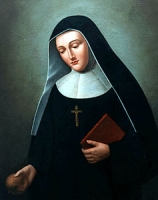
• Maria Adeodata
• Teresa Pisani
Daughter of Baron Benedict Pisani Mompalao Cuzker and Vincenza Carrano. Her father was rich, noble, Maltese, and an alcoholic, so the girl was raised by her grandmother. Her father was involved in a revolt, and exiled to Malta in 1821; Adeodata and her mother joined him in 1825.
Benedictine novice at age 21; she renounced her wealth and title when she took her final vows. Cloistered nun for the rest of her life. Seamstress, sacristan, porter, teacher, and novice mistress. Abbess from 1851 to 1853, her ill health forcing her to end her service early. Noted for her sanctity, her love of the poor, self-imposed austerities, and ecstacies so complete that she was seen to levitate.
29 December 1806 at Naples, Italy
25 February 1855 from heart problems at the Benedictine monastery at Mdina, Malta
• 9 May 2001 by Pope John Paul II
• her beatification miracle occurred on 24 November 1897 when abbess Giuseppina Damiani from the Monastery of Saint John the Baptist Subiaco, Italy was suddenly healed of a stomach tumour following her request for Maria Pisani's intervention
• Blessed Maria's Cause was delayed for years due to lack of funds, and political problems between Malta and Italy
against cancer
Born in Italy of a Maltese father, Sister Maria Adeodata Pisani came here at the age of nineteen, and spent most of her life as a splendid figure of Benedictine religious consecration in the Monastery of Saint Peter. I know that some of the Sisters of the Monastery were not able to come here, but are following this ceremony on television. To you, dear Sisters, I send a very special blessing on this happy day. Prayer, obedience, service of her Sisters and maturity in performing her assigned tasks: these were the elements of Maria Adeodata's silent, holy life. Hidden in the heart of the Church, she sat at the Lord's feet and listened to his teaching (cf. Luke 10:39), savouring the things that last for ever (cf. Colossians 3:2). Through her prayer, work and love, she became a well-spring of that spiritual and missionary fruitfulness without which the Church cannot preach the Gospel as Christ commands, for mission and contemplation require each other absolutely (cf. Novo Millennio Ineunte, 16). Sister Adeodata's holy example certainly helped to promote the renewal of religious life in her own Monastery. I therefore wish to commend to her intercession a special intention of my heart. Much has been done in recent times to adapt religious life to the changed circumstances of today, and the benefit of this can be seen in the lives of very many men and women religious. But there is need for a renewed appreciation of the deeper theological reasons for this special form of consecration. We still await a full flowering of the teaching of the Second Vatican Council on the transcendent value of that special love of God and others which leads to the vowed life of poverty, chastity and obedience. I commend to all consecrated men and women the example of personal maturity and responsibility which was wonderfully evident in the life of Blessed Adeodata. - Pope John Paul II during the beatification Mass for Blessed Maria
https://catholicsaints.info/blessed-maria-adeodata-pisani/
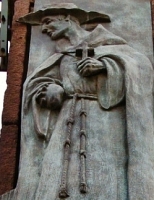
• Angel of Mexico
• Sebastián de Aparicio Prado
Born of Spanish peasants. Shepherd as a child, and a hired field hand as a young man, helping to support his family. Gentleman's valet at Salamanca. He travelled to Puebla, Mexico at age 31 where he built plows and wagons, and worked as a farm hand. Spent 10 years building a 466 mile road from Mexico City to Zacatecas, and conducting the postal and delivery service along the route; the road is still in use today.
Sebastian eventually became very wealthy, but lived simply, and gave freely of his money to the poor. He was married twice, the first time at age 60, but he never consummated the marriages, and outlived both brides. He gave away his wealth and became a Franciscan at age 72, spending his remaining 25 years begging alms for his brother Franciscans. Witnesses attest to over 300 miracles he performed in life.
20 January 1502 in La Gudiña, Orense, Spain
• 25 February 1600 of natural causes
• lies in the Chapel of the Virgin of the Conquest, Church of Saint Francis of Assisi, Puebla, Mexico
• body incorrupt
17 May 1789 by Pope Pius VI
• drivers
• road builders
• travellers
https://catholicsaints.info/blessed-sebastian-of-aparicio/
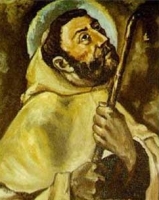
Aventanus, Avertanus
4 March (Carmelites)
Carmelite lay brother. Miracle worker who received visions, and was known for his deep, mystical prayer life. With a brother Carmelite, he made a pilgrimage to the Holy Lands, but died in a plague epidemic on the way home.
diocese of Limoges, France
• c.1366 in Lucca, Tuscany, Italy of plague
• buried in the hospice church of San Pietro
• so many miracles were reported at his grave that a series of paintings depicting some of them were made for the San Pietro church and the cathedral of Lucca
• relics transferred to the cathedral of Lucca in 1513
• relics returned to the church of San Pietro in 1646
• relics enshrined in the church of Saints Paolino and Donato in 1806
• added to the Carmelite calendar in 1514
• Office made obligatory by the General Chapter of the Carmelies in 1564
• Office sanctioned by the Vatican in 1609
• approved by the Sacred Congregation of Rites on 12 May 1672
• Office and Mass extended to the entire archdiocese of Lucca, Italy on 16 July 1828
• by Pope Gregory XVI (cultus confirmation)
https://catholicsaints.info/blessed-avertano-of-lucca/

• Sister Rani Maria
• Regina Maria Vattalil
The second child of Paily and Eliswa of Vattalil, Mariam was baptized in the church of Saint Thomas at the age of 7 days. She joined the Franciscan Clarist Congregation, taking the name Rani Maria, and making her solemn vows on 22 May 1980. Missionary in the diocese of Bijnor, Uttar Pradesh, India. Her work there to help the poor put her in conflict with the money lenders, landlords and criminals who exploited them, and she was murdered to stop her work. Martyr.
29 January 1954 in Pulluvazhy, Ernakulam, India
• stabbed and beaten to death on a bus on 25 February 1995 near Udainagar, Bagli, Dewas, India by Samandar Singh
• Singh was arrested, convicted and sentenced to life imprisonment for the murder; he was released in 2006, has met with and was forgiven by Blessed Mariam’s family, and attended the beatification celebration
• 4 November 2017 by Pope Francis
• the beatification recognition was celebrated at the Saint Paul Institute of Professional Studies in Indore, India with Cardinal Angelo Amato as the chief celebrant
https://catholicsaints.info/blessed-mariam-vattalil/
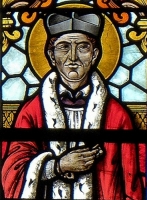
Roberto d'Arbrissel
Son of a village priest, he became a priest himself. Archpriest at Rennes, France where he was known both as a reformer (which often stirs up trouble), and as a peace-maker. Teacher at Angers, France. Hermit in the forest of Craon, France where he founded a community of canons. He was a noted preacher, and when Pope Urban II heard him speak in 1095, the pope ordered Robert to devote himself to preaching. He travelled the region, preaching missions, attracting would-be students, and being accused by his detractors of sleeping with the local women who listened to him. He founded a double monastery that became the modern Fontevraud-l'Abbaye in Pays-de-la-Loire, France. He wrote a Rule for the community and handed over its administration to an abbess; it soon became the mother-house of the Order of Fontevraud, and the Rule received papal approval in Calixtus II in 1119.
Ille-et-Vilaine, Brittany (modern Arbrissel, France)
1116 of natural causes
https://catholicsaints.info/blessed-robert-of-arbrissel/

• Lawrence Pe-Man
• Laurence Pe-Man
• Luolong
• 24 November as one of the Martyrs of Cochin
• 28 September as one of the Martyrs of China
Born to a poor family, and orphaned as a young boy. Layman. Day labourer in Guangxi, China, and then in the village of Yaoshan. Married in his early 30's, he was the father of one daughter, and was known as a kind and honest man. Convert, joining the Church c.1855 and taking the name Lawrence. Spiritual student of Saint Augustus Chapdelaine. When he protested the arrest of Augustus, local officials ordered Lawrence to renounce Christianity; when he refused he was arrested, tortured and sentenced to death. Martyr.
c.1821 in Shuicheng, Guizhou, China as Loulong
• beheaded on 25 February 1856 in Su-Lik-Hien, Kwang-Si province, China
• body dumped in a wooded area and left for wild animals
1 October 2000 by Pope John Paul II
https://catholicsaints.info/saint-laurentius-bai-xiaoman/
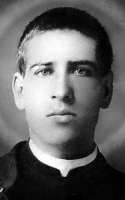
21 May as one of the Martyrs of the Mexican Revolution
Ordained at age 21; he had to receive special dispensation from the Vatican to be ordained so young. Parish priest in Tequila, Jalisco, archdiocese of Guadalajara, Mexico. Parish priest in Agua Caliente, Mexico. Known for a great devotion to the Eucharist. Murdered during the Mexican Revolution for being a priest. One of the Martyrs of the Cristero Wars.
16 April 1900 in Santa Ana de Guadalupe, Jalostotitlán parish, San Juan de los Lagos diocese, Jalisco, Mexico
• shot in the back around 5am on Saturday 25 February 1928 in his rectory in Agua Caliente, Jalisco, Mexico
• relics in the Santa Ana de Guadalupe Church, Jalisco
Sunday 21 May 2000 by Pope John Paul II
immigrants
Lord, do not leave me nor permit a day of my life pass without my saying the Mass, without receiving your embrace in communion. - prayer of Saint Toribio
https://catholicsaints.info/saint-toribio-romo-gonzalez/
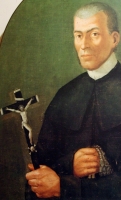
Youngest of five children in a poor but pious family. By age 14 he felt a call to the priesthood, studied at the seminary in Salerno, Italy and was ordained in the diocese of Tursi-Lagonegro, Italy in 1794. He was assigned to his hometown of Lauria, Italy and worked there the rest of his life.
Known for his self-imposed poverty, his devotion to the Eucharist and Our Lady of Sorrows, as a noted homilist, for his work with the poor, and for being always available to his parishioners. He turned his home into a school, teaching catechism and theology, but also literature and philosophy. His humble devotion to the Church and his parishioners led all who knew him to consider him a model for priests, and a saint even in life.
20 November 1770 at Lauria, Potenza, Italy
25 February 1828 at Lauria, Potenza, Italy of natural causes
12 October 1997 by Pope John Paul II at Rome, Italy
Lauria, Italy
https://catholicsaints.info/saint-domenico-lentini/
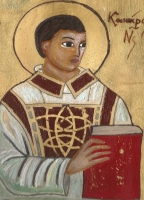
Son of Saint Gregory of Nazianzen the Elder and Saint Nonna. Brother of Saint Gorgonia and Saint Gregory of Nazianzen. Studied in Caesarea, Cappadocia, and Alexandria, Egypt. Noted and skillful physician. He moved to Constantinople c.355 where he became wealthy in his profession. Served in the court of Emperor Julian the Apostate who tried to get Caesarius to renounce his faith; when he refused, he was exiled. From there he moved to Bithynia where he served Emperor Valens as quaestor. Confirmed bachelor, though he had offers to marry into nobility. Upon his death he donated his entire estate to the poor.
c.329 in Arianzus
• c.369 of natural causes
• interred at Nazianzus
bachelors
https://catholicsaints.info/saint-caesarius-of-nanzianzen/
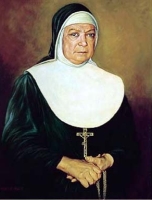
Antonina
The eldest of eight chidren born to a peasant family. Against the opposition of her family, Antonina joined the Daughters of Our Lady of Mercy on 17 November 1904, taking the name Sister Maria Ludovica. Beginning in late 1907, she served in the missions in Argentina as a manager and administrator of a children‘s hospital in La Plata; she served for nearly 55 years, building the hospital from a wooden structure with two wards to a fully functioning modern hospital. She spent her days caring not only for the patients, but the medical staff, as well.
24 October 1880 at San Gregorio, Italy as Antonina
• 25 February 1962 at La Plata, Argentina of abdominal cancer
• relics enshrined in the cathedral of Nuestra Señora de los Dolores in La Plata
3 October 2004 by Pope John Paul II
https://catholicsaints.info/blessed-maria-ludovica-de-angelis/
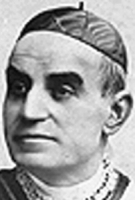
Ordained on 27 June 1858. Auxiliary Bishop of Toledo, Spain, and Titular Bishop of Areopolis on 28 January 1876. Bishop of Avila, Spain on 27 March 1882. Bishop of Madrid, Spain on 10 April 1886. Archbishop of Valencia, Spain on 6 October 1892. Elevated to Cardinal-Priest of San Pietro in Montorio on 18 May 1894 by Pope Leo XIII. Founded the Congregation of the Sisters of Charity of Cardinal Sancha. Archbishop of Toledo, Spain and Patriarch of the West Indies on 24 March 1898. Participated in the conclave of 1903 that elected Pope Saint Pius X.
18 June 1833 in Quintana del Pidio, Burgos, Spain
25 February 1909 in Toledo, Spain of natural causes
• 18 October 2009 by Pope Benedict XVI
• beatification recognition celebrated in the cathedral of Toledo, Spain, Archbishop Angelo Amato chief celebrant
https://catholicsaints.info/blessed-ciriaco-maria-sancha-hervas/
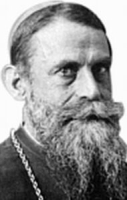
Aloisius Versiglia
• 13 November (Salesians)
• 28 September as one of the Martyrs of China
Studied at Don Bosco's Oratory from age 12. Salesian. Ordained on 21 December 1895. Missonary to China in 1906. Appointed vicar apostolic of Shiuchow, China, and titular bishop of Carystus, on 22 April 1920. On 25 February 1930, while travelling with Saint Callistus Caravario, his ship was boarded by Bolshevik pirates who planned to abduct and enslave the girls on their ship; Callistus and Luigi fought to prevent them. Marytr.
5 June 1873 in Oliva Gessi, Padua, Lombardy, Italy
shot on 25 February 1930 in Shiuchow [Shaoguan] China
1 October 2000 by Pope John Paul II
https://catholicsaints.info/saint-luigi-versiglia/
Sister Maria Adela
A member of the Sisters of Saint Elizabeth, making her first profession on 16 August 1915 and her perpetual profession on 29 June 1924. She served in Ramultowice, Szklarska Poreba, Walbrzych-Sobiecin, and Godzieszów, where she was the superior of her house. When the village was overrun by Soviet soldiers near the end of World War II, she tried to hide from them on the farm of Pawel and Maria Baum. However, they found her, and when she tried to fight off a would-be rapist soldier, she, the Baums and some other people hiding there were murdered. Martyr.
3 June 1885 in Laczna, Klodzko, Poland
• shot on 25 February 1945 in Godzieszów (a.k.a. Günthersdorf), Boleslawiec, Poland
• buried in a bomb crater on the farm
11 June 2022 by Pope Francis
https://catholicsaints.info/blessed-klara-schramm/
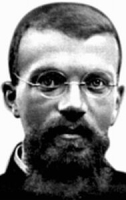
Callisto, Calixto
28 September as one of the Martyrs of China
Known as a pious and prayerful child. Salesian missionary priest. He worked at Macao, China, then in Timor, and then on 18 May 1929 in Shiuchow, China. On 25 February 1930, while travelling with his bishop, Saint Luigi Versiglia, his ship was boarded by Bolshevik pirates who planned to abduct and enslave the girls on their ship; Callistus and Luigi fought to prevent them. Martyr.
18 June 1903 in Cuorgné, Italy
shot on 25 February 1930 off the coast of Shiuchow, China
1 October 2000 by Pope John Paul II
https://catholicsaints.info/saint-callistus-caravario/
A group of Christian men who were exiled to Egypt for their faith and were eventually martyred for their faith in the persecutions of Numerian. We know little more than the name - Claudianus, Dioscurus, Nicephorus, Papias, Serapion, Victor and Victorinus.
283 in Diospolis (modern Hu), Egypt

• Gerland of Agrigento
• Gerlando, Giullannu
Bishop of Girgenti (Agrigento), Sicily. Worked for the restoration of Christianity throughout Sicily after the Saracens were driven out by his relative, Robert Guiscard of Normandy.
at Besancon, France
1104 on Sicily of natural causes
• Agrigento, Sicily, archdiocese of
• Agrigento, Sicily, city of
https://catholicsaints.info/saint-gerland-the-bishop/

• Nestor of Magydos
• Nestor of Perge
• Nestore...
Bishop of Side, Pamphylia (in modern Antalya, Turkey), known for his personal piety and his zeal as an evangelist. Arrested and executed by order of governor Epolius during the persecutions of Decius. Martyr.
crucified in 250 in Perge, Pamphylia (in modern Turkey)
https://catholicsaints.info/saint-nestor-of-side/
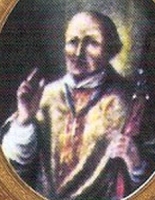
Adelelmus, Adelhelm
Benedictine monk at the Saint Blaise monastery in the Black Forest. Founded the abbey of Engelberg nell'Unterwalden in Switzerland, then served there as prior and abbot.
• 25 February 1131 at the abbey of Engelberg nell'Unterwalden, Switzerland of natural causes
• relics enshrined in 1611
https://catholicsaints.info/blessed-adelelmo-of-engelberg/
Born to the Florentine nobility, Clemente joined the lay Franciscans in 1399 at the convent of Santa Maria del Fiore in Fiesole, Italy where he became known for a life of penance, subsisting on only bread and water, and for his ministry to and support of the poor.
latter 14th century in Florence, Italy
• 1456 in Fiesole, Italy
• buried in the convent in Fiesole
https://catholicsaints.info/blessed-clemente-capponi/
Eustasius, Eustazio, Eustachio, Eustasio
Eustathius assisted Saint Eusebius of Vercelli when Eusebius was exiled. After getting to know him, Eusebius then recommended him be chosen the first bishop of ancient Augusta Pretoria (modern Aosta, Italy) in the late 4th century. Saint Gratus of Aosta was one of his priests and assistants.
https://catholicsaints.info/saint-eustathius-of-aosta/
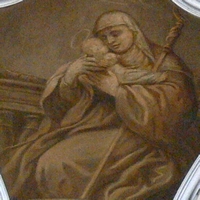
Adeltrudis, Aldetrude
Daughter of Saint Vincent Madelgarus and Saint Waldetrudis; sister of Saint Madalberta; niece of Saint Aldegund of Maubeuge. Nun and then abbess at the convent led by her aunt Aldegund.
France
c.696
https://catholicsaints.info/saint-aldetrudis/
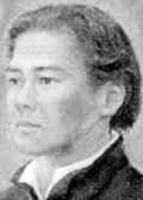
Jesuit priest. Martyr.
c.1575 in Awa, Tokushima, Japan
25 February 1636 in Osaka, Japan
24 November 2008 by Pope Benedict XVI
https://catholicsaints.info/blessed-didacus-yuki-ryosetsu/
Ananias III
Third-century priest. Martyred in the persections of Diocletian along with seven soldiers whose names have not come down to us.
298 in Phoenicia
https://catholicsaints.info/saint-ananias-of-phoenicia/
Ernin Cas of Leighlin
This person is listed in the Tallagh and Donegal Martyrologies, but no details about them have survived.
https://catholicsaints.info/saint-ernin-cas-of-leithglinn/
Concordio, Concorde
Bishop of Saintes, France c.600.
late 5th century
6th century
https://catholicsaints.info/saint-concordius-of-saintes/
Gotthard
Hermit in a cell high in the Alps near a mountain range and pass now known as Saint Gothard in his honour.
https://catholicsaints.info/saint-gothard-the-hermit/
Monk at Saint Gall in Switzerland. Hermit in the Vosges, France.
995 in Vosges, France
https://catholicsaints.info/saint-victor-of-saint-gall/
One of a group of 3rd-century Christians martyred in North Africa in the persecutions of Decius.
https://catholicsaints.info/saint-donatus-the-martyr-0225/
Bishop. Martyr.
tortured to death in 362 on the island of Skopelos, Greece
Skopelos Island, Greece
https://catholicsaints.info/saint-riginos/
One of a group of 3rd-century Christians martyred in North Africa in the persecutions of Decius.
https://catholicsaints.info/saint-justus-the-martyr/
One of a group of 3rd-century Christians martyred in North Africa in the persecutions of Decius.
https://catholicsaints.info/saint-herena/
• Our Lady of Great Power (Quebec, Canada)
• Our Lady of Victory (Constantinople)
CatholicSaints.Info Portable Edition